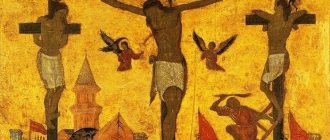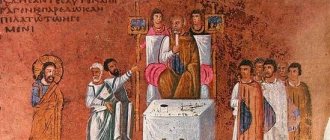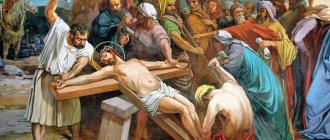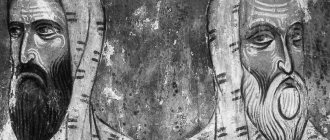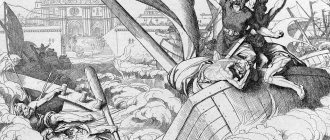According to the Gospel, the tormentor of Jesus, Pontius Pilate, in accordance with subsequent “editions”, becomes a saint. The personality of Pilate is sometimes interpreted radically differently in many cultures. Is it possible to find the real one between the conflicting versions of his life after the crucifixion of Christ? What face of the mysterious procurator looks at us from the pages of history?
It is no coincidence that one of the main characters of “The Master and Margarita” is Pontius Pilate. His dialogue with Jesus is one of the most intriguing parts of the Gospel. There is a lot of uncertainty and tragedy in it of a man who is faced with a difficult choice: to support an unknown prophet or to fulfill his duty to Caesar. To this day, the multidimensional character of Pilate continues to intrigue not only historians and writers. Perhaps he really had no choice, because he was entangled in the political games of the Jewish priests? Or maybe he himself led to this situation with his inept policy towards the occupied Israelis?
Position in society
Pontius Pilate is the fifth procurator of Judea. The character belongs to a select class. The author points out several times that the hero holds the lives of many people in his hands, since “Roman power speaks” in him. During his service, Pontius Pilate leads the Roman army and deals with various legal proceedings. As a result of all this, Pontius Pilate is a very rich and privileged man. Caesarea is the hero’s place of residence. He has to visit Yershalaim, in which Pilate met with Yeshua Ha-Nozri, although he hates this city to madness. In relation to Yershalaim and in relation to his own service as a whole, the character of the hero is shown.
Pontius Pilate: the man who could have prevented Jesus' execution
Estimated reading time: 6 minutes.
We are free to change our minds—as long as we live—and God humbly waits to see what we decide. But one day the time comes to make the final choice. For many people who surrounded Christ during the days of His earthly life, this time came on the eve of His suffering. Everyone had to decide whether he was with Christ or with the opponents of Christ.
Read about who made what decision and how it was given to him in the Thomas project “Heroes and Anti-Heroes of Holy Week.”
Pontius Pilate was the only one who could really change the fate of Jesus Christ. And he tried to change it.
Judging by the reviews of his contemporaries, Pilate, who was appointed Roman governor (prefect) of Judea in 26, was not distinguished by either justice or even simple decency. The Jewish philosopher Philo of Alexandria described him as a cruel and corrupt man, the culprit of numerous executions carried out without any trial. And the Jewish king Herod Agrippa even complained to Emperor Caligula about the “endless and unbearable cruelty” of Pilate.
There were probably grounds for such characterizations, although those accusing Pilate were not impartial. The fact is that the procurator did not have a good relationship with the Jews from the very beginning. All residents of Judea experienced the loss of state independence very hard (after the death of Herod the Great in 4 BC) and even in unprincipled issues stubbornly defended national customs and traditions.
There is a known case when Pilate, deciding to demonstrate his devotion to the emperor, ordered banners with his image to be brought into Jerusalem. The Jews reacted to this extremely painfully: for five days they surrounded the residence of the prefect (praetorium), periodically making attempts to storm and loudly demanding the removal of pagan images from the holy city. Pilate's threats to kill everyone indiscriminately did not work. In the end he was forced to yield, but he formed the most unfavorable opinion of the Jews.
| Read also: Pilate is not guilty of anything?
Another story made Pilate no less angry when he decided to build a water supply system in Jerusalem. The idea was sound: the city often lacked clean drinking water, especially on holidays, when hundreds of thousands of pilgrims from many countries came here. But Pilate proposed financing the enterprise from the temple treasury, and the high priest and other members of the Sanhedrin (the highest government body of Judea) were categorically against it. The story with the threats repeated itself, and again Pilate backed down.
Among the Jews there were many Zealots - zealots of the Mosaic Law, who seriously sought to overthrow the Roman yoke. Here and there rebellions arose (we also find references to the rebels Barabbas, Theudas and Judas the Galilean in the books of the New Testament), and Pilate often had to bother the emperor, asking for military support.
In a word, Pilate, to put it mildly, did not like the Jews with their religious customs and endless strife, and they reciprocated his feelings.
And yet, on the day before the Jewish Passover, when the Galilean Jesus was brought to him, the Roman prefect decided to show integrity. Why?
Perhaps he wanted to offend the Jewish leaders, who were always causing troubles for the most ridiculous reasons. Have they made up their minds about Jesus yet? Well, great, let them carry out their decision themselves. And if they need the sanction of a Roman official, then there will be a full-fledged trial, without any haste. “Sorting out a small formality” will not work quickly. The Jews are principled in their national customs, and the Romans are principled in following the law.
In fact, of course, Pilate was unlikely to dive into the essence of the claims against Jesus. Therefore, he began with the simplest questions: are you justly accused? Are you really the King of the Jews? If Pilate was hoping for the same simple answer, he did not receive it. The defendant did not say “yes” or “no”; He answered as it is: My kingdom is not of this world; If My kingdom were of this world, then My servants would fight for Me, so that I would not be betrayed to the Jews; but now my kingdom is not from here (John 18 :36-37). Not wanting to tinker with this matter for long, Pilate made another attempt to get a short and clear answer. So are you the king? - he clarified. And again I heard not what I had hoped for: You say that I am the King. For this purpose I was born and for this purpose I came into the world, to testify to the truth; everyone who is of the truth listens to My voice.
The last thing Pilate wanted was to engage in philosophical discussions about what truth is, so he decided to simply let Jesus go. If not because of His innocence (whether He pretended to be a king or not, Pilate did not fully understand, but He clearly was not dangerous), then at least because of the custom of releasing one of the condemned on the eve of Easter.
But then Pilate encountered the already familiar stubborn resistance of the people, which the high priests had already managed to process. The people demanded the release not of Jesus, called Christ, but of another prisoner, the rebel Barabbas.
This happens: you want to make an easy decision that suits everyone and calm down, but circumstances suddenly begin to resist, force you to get to the bottom of it, figure it out and make a decision on the merits, no matter how difficult it may be.
The crowd more and more insistently demanded that Christ be executed, and Pilate had more and more arguments in favor of His release.
Firstly, he already knew that the high priests demanded the condemnation of Jesus out of envy. Secondly, his own wife asked not to cause any harm to the Righteous One whom the Jews had sent: she suffered much for Him in a dream” (Matthew 27:19 ). And most importantly, the longer Pilate talked with Jesus, the more he realized that this was a special Man. If the Pharisees and high priests were only indignant when they heard that the Savior called himself the Son of God, then Pilate, having learned about this, was afraid and sought to let Him go (John 19 :8, 12). Apparently, some living chord was touched in the soul of the Roman prefect. Or maybe he was simply afraid: being a pagan, Pilate could well admit that the Jews also have their own God, and it is better not to be at enmity with Him.
Moreover, he should have been alerted by the words of Jesus: You would not have any power over Me if it had not been given to you from above; Therefore, he who delivered Me to you has greater sin (Jn. 19: 11).
Pilate made at least three attempts to free the Savior. But it all ended the same as in his previous clashes with the Jewish crowd: he had to retreat. The high priests were unable to convince him that Jesus was guilty and then resorted to outright blackmail: If you let Him go, you are not a friend of Caesar; “Whoever makes himself a king is adversary to Caesar” (John 19:12 ). This argument worked. Pilate symbolically washed his hands in front of the crowd and declared: I am innocent of the blood of this Righteous One; look you (Matthew 27:24 ).
Thus, Pilate’s cowardice canceled out all his attempts to act according to his conscience.
Could Pilate have insisted on his own?
Surely he could. No man is a blind instrument of God's Providence, and neither was Pilate. He just didn’t want to escalate the conflict with the Jews. They really could have reported him to the emperor. Although, if you look at it, such a denunciation would hardly have harmed his career: the release of Barabbas, who openly rebelled against the Romans, would certainly have been a more serious offense in the eyes of Rome than the release of the “King of the Jews.”
In the end, Pilate was still deposed due to denunciation. The inhabitants of Samaria (an area north of Judea) complained against him after he executed many of their fellow citizens who had gathered for some reason on Mount Gerizim, sacred to them. Church historian Eusebius of Caesarea writes that Pilate was sent into exile, where he committed suicide.
Thus died a man who played one of the most important roles in gospel history.
Character
The image of Pontius Pilate is viewed ambiguously by researchers. This happens because of the character of this principled person.
The writer several times calls the procurator “cruel,” and Pilate himself admits this: “I am a ferocious monster.” The hero is used to being considered this way; this emphasizes his ability to be the ruler of destinies. Pontius is a hot-tempered and formidable man who cannot have mercy on Yeshua because of his service and the fear of losing it.
Despite his menacing and arrogant appearance, the procurator turns out to be a fearful and reserved person. Cowardice is the main vice of the hero, as Ga-Nozri points out.
However, the reason for all this was the hero’s loneliness.
Origin of the Roman Horseman
Most often, in the absence of a sufficient number of written monuments of the era under study, the ethnic roots and origin of a historical character are determined by analyzing the first and last name. So where did the man come from who was appointed by Tiberius to command the imperial guard (prefect) and received the title of Roman horseman and the position of procurator of Judea? Who is he - a warrior of Germanic origin (Cheruscus) or an Italian (Samnite) who was in the mercenary troops of the Romans?
The only thing that most historians agree on is that the future procurator was unlikely to be a Roman by birth and his exact name is unknown.
The first version is supported by the fact that Pilate is a nickname indicating the occupation of his ancestors (javelin thrower, spearman). Pont is a city in Germany, near Bamberg. In confirmation of Pilate's Germanic roots, the following event is cited: in the battle of Idistavizo, the future procurator of Judea commanded the Roman cavalry turma. A brave warrior - a Cheruscus named Ingomar (the illegitimate son of the king of Mainz - Tire) was named Pilate for his keen eye. The city of Lugdune in Gaul (on the modern map of Lyon, France) became his patrimony.
Another medieval Maincian legend has a romantic overtones and says that Pilate (Pila-Atus) is formed from the addition of the names of his parents who lived in Rhineland Germany: the astrologer king Atus and his wife, the miller’s daughter, whose name was Pila.
Researchers who insist on Pilate's Italian roots claim that he came from the middle strata of the Samnites and was born in the province of Abruzzi on the Adriatic. The direct translation of the nickname Pontius means “hairy”, and the name Pilate translates as “Black Sea”.
But there are also scientists who are trying to prove that Pilate is an aristocrat from the noble Roman family of Pontius, which belonged to the privileged class of equites (horsemen). In Latin, pilatus means "spearman." His wife was the illegitimate daughter of Tiberius, the granddaughter of Emperor Augustus Octavian, Claudius, which determined Pilate’s diplomatic career.
Thus, over the past two millennia, on the embossed profile of the “iron praetor” the mark on his exact ethnic origin was practically erased.
So is it guilty or not?
Pilate's behavior seems strange. He wants to save - and gives it to death; finds not guilty - and confirms the guilty verdict; calls Him Righteous - and releases the murderer in His place. However, this contradictory nature of actions only confirms one of the most important ideas of Christianity: without the help of God, a person cannot do good. One who does not have an answer to the question “what is truth?” is not even able to distinguish between good and evil.
The entire sequence of Pilate’s actions at the trial is a convincing illustration of the words of the Apostle Paul, describing this disastrous state of fallen man: ... For I know that nothing good dwells in me, that is, in my flesh; because the desire for good is in me, but I don’t find it to do it. I don’t do the good that I want, but I do the evil that I don’t want. But if I do what I do not want, it is no longer I who do it, but sin that dwells in me (Rom. 7:18-20). In a person unrenewed by grace, sin operates, distorting all his good intentions, turning all his thoughts, words and actions inside out, turning good and evil into relative concepts that have no clear definitions. Pilate wanted to do good - to protect Christ from the Jews thirsting for His blood. He did not want the Righteous One to die. But in the end he went down in history as a judge who pronounced the death sentence on an innocent man and washed his hands of it after that.
Those weak sparks of goodness that were inherent in him, like any person, called Pilate to justice and a fair trial. The sin that acted in him, as in any person, demanded the murder of any good, and above all, the Supreme Good that was in his power. That's why
It is not in the contradictory recesses of Pilate’s personality that one should look for an explanation for what he did, but in the effect of sin on the nature of man, even if he desires good.
The Monk Justin (Popovich) writes: “Corroded by skepticism, the pagan consciousness of Pilate <...> acts fragmentarily, thinks fragmentarily: then he is surprised at Jesus; then he anxiously asks why He is silent; then he authoritatively asks the accusers the question: what evil did He do? His whole consciousness breaks and flows, as if on quicksand, and wants to lay and build on a grain of sand the foundation of his conclusions about Jesus. Pilate's entire soul is scattered, his entire conscience is upset, his entire will is relaxed: both his consciousness of truth and his sense of truth, sparklingly, instantly, the spark will flash, and immediately drown in the darkness of skepticism, in the darkness of voluptuousness, in the darkness of love of sin.
Pilate commits evil that he does not want, rather than doing good that he wants. This is where his entire responsibility lies, that he is consciously in slavery to such untruths. Therefore, the cure for this disease is not in man, not in people, but in the God-man. For only He has the medicine, love, and strength for this.”

